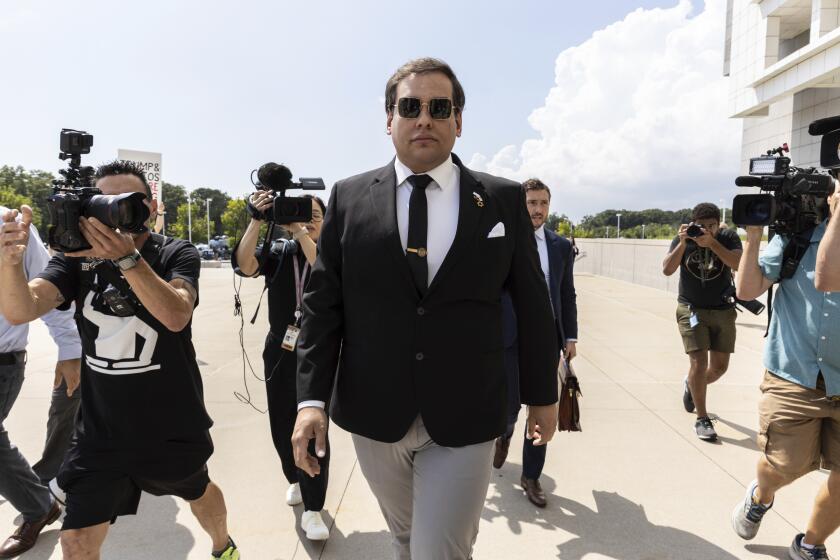Influence Peddling Grows, Deaver Prosecutor Charges
The prosecutor who won the perjury conviction of former White House aide Michael K. Deaver complained Thursday that federal officials have so little concern for ethics that prosecutors can only “put a thumb in the dike” to hold back illegal influence peddling.
Whitney North Seymour Jr., the court-appointed independent counsel, said that unethical practices have proliferated in Washington, where “vast sums of money” are spent by U.S. corporations and foreign governments “to buy influence and favors.”
Seymour, meeting reporters on the steps of the U.S. courthouse a day after Deaver’s conviction, urged that the 9-year-old federal law governing conflicts of interest among former high government officials be tightened.
“The successful outcome of the Deaver trial should not be mistaken as a resolution of the more serious problem which brought about the appointment of an independent counsel in the first place. That problem is too much loose money and too little concern in Washington about ethics in government,” he said.
The remarks, coming from a veteran prosecutor, amounted to a broad indictment of the way the government itself tolerates unethical practices. And, given the fact that Seymour is a Republican, his statements weighed heavily on the Reagan Administration in particular, for they could not be dismissed as a partisan political attack.
“Leadership is the key,” Seymour said. “So long as the White House and Cabinet members say, ‘We’re running an ethical Administration,’ you’re going to have ethics. If you don’t have that at the top, it isn’t going to work.”
Without mentioning him by name, Seymour sharply criticized Secretary of State George P. Shultz for vouching for Deaver’s honesty after Seymour had called Shultz as a prosecution witness at the just-concluded trial. Shultz contradicted Deaver’s grand jury testimony by disclosing that Deaver had visited him in his State Department office after resigning from the White House in 1985 to lobby for a Puerto Rican tax break on behalf of a business client.
Shultz as Character Witness
The prosecutor had expressed anger during the trial when Shultz, under cross-examination by Herbert J. Miller Jr., Deaver’s defense attorney, endorsed the honesty and character of Deaver, a person he had known for years.
Seymour told reporters that “the third highest-ranking official in the U.S. government” should not have “willingly and publicly endorsed the honesty of a former high official, charged with perjury, without even bothering to read the indictment or inquire whether the charge had substance.”
Shultz has demonstrated “the present level of leadership . . . in ethics,” he said.
Seymour, acknowledging that dozens of present or former Administration officials have been subjected to ethics investigations, criticized the “back-door, back-stairway favor buying” that has characterized the Deaver case and some others.
Includes Wedtech Inquiry
Other cases include an inquiry by another independent counsel into alleged influence buying by the scandal-plagued Wedtech Corp., a New York defense contractor that paid hundreds of thousands of dollars to former Administration figures and political consultants, including past associates of Atty. Gen. Edwin Meese III.
A former U.S. attorney in Manhattan during the Richard M. Nixon Administration who specialized in political corruption cases, Seymour pointed to the post-Watergate Ethics in Government Act as containing too many “loopholes and exemptions.”
“Until the attitudes of government leaders change, there is little that prosecutors can do except put a thumb in the dike,” he said.
The independent counsel’s views on the 1978 ethics law won the immediate endorsement of Sen. Carl Levin (D-Mich.), who has conducted Senate hearings on proposals for revising federal ethics statutes. “We hope to have the Senate take up legislation to improve the law at the beginning of the next session of Congress in January,” Levin said.
White House Compartments
In discussing “loopholes and exemptions” in the Ethics in Government Act, Seymour noted that the law so compartmentalizes the White House that a former presidential aide like Deaver is permitted to lobby officials of other White House offices like the National Security Council and the Office of Management and Budget on grounds that they are separate agencies.
This is the case, he said, despite the fact that the act generally forbids a former government official from lobbying his ex-colleagues at his former agency for at least 12 months after he leaves government service.
For this reason, former Deputy White House Chief of Staff Deaver--whose former agency is the White House--was not charged with any direct violations of the act for his lobbying activities. Instead, he was accused of perjury on grounds that he lied about his actions to protect his business and to shield his friends in government from embarrassment.
More to Read
Sign up for Essential California
The most important California stories and recommendations in your inbox every morning.
You may occasionally receive promotional content from the Los Angeles Times.










